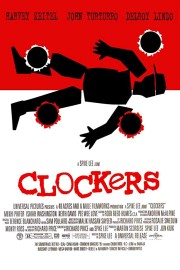Clockers
1995’s “Clockers” feels like a Spike Lee film, but it also feels like a film Spike Lee wrestled with. The style, the language, the use of music and the performances all feel of a piece with Lee’s previous work (as well as a lot of his later work), but the film also feels like he’s trapped within the confines of the police procedural written by Richard Price that he adapted with the author for the screen. His New York University mentor, Martin Scorsese, was originally set to direct the film, but after he moved to making “Casino,” Lee took over, and while it feels much more like a Lee film than a Scorsese film, I’m not going to lie- this would have been a fascinating different type of crime drama for Marty to direct.
Clockers is a term for street-level drug dealers, and it’s in that world which we inhabit in this film as we follow Strike (Mekhi Phifer), one such dealer, through his days. He’s part of a group of dealers in the Brooklyn projects who work for Rodney Little (the fantastic Delroy Lindo), and Strike spends his time playing with model trains as well as dealing in the park. They occasionally get harassed by the cops, and they certainly have a reputation in their community (the mother of young Tyrone (Peewee Love) doesn’t like Strike being anywhere near her son), but Strike still avoids trouble, for the most part, even with a pretty terrible stomach ache Rodney wants him to go to his doctor to get looked at. One night, Rodney is talking to Strike about his potential working with him, and mentions a store manager at a local fast food joint who is skimming from Rodney. Not long after that, the manager- Darryl Adams- is dead, and to our knowledge, Strike was the one who pulled the trigger? But, when two detectives- Rocco Klein (played by Harvey Keitel) and Larry Mazilli (played by John Turturro)- come to investigate, Strike is still there, without blood on him? Did he do it? Did he get his brother (Victor, played by Isaiah Washington) to kill him? That is the question for the rest of the film.
When Spike Lee works explicitly within a particular genre, his style often wins out over his personal voice, because how much of his personal worldview can he inject into a film like “Inside Man,” “Oldboy” or “Miracle at St. Anna?” “Clockers” very much feels in that same vein of Spike Lee joint, where genre conventions supersede his ability to interject something of himself in the film. (“Miracle at St. Anna” is a bit of an anomaly in this respect, where his style feels muted but his voice is rather clear in this WWII drama.) For much of its running time, “Clockers” is engulfed in the confines of its genre, as Rocco and Larry are working the case of figuring out not only who killed Adams, but why, and the result had a tough time holding my interest, despite terrific performances all around. But it’s easy to see why Lee decided to make this film, because it deals with black youth on the precipice of living straight, or taking the path of crime, and it lands those beats extremely well, especially in the dynamic between Strike and Tyrone, and there’s a father figure in Keith David’s police officer “Andre the Giant” that allows the actor some sensational scenes trying to instill some responsibility in Strike, and keep Tyrone from following that same path. This part of the film is where is really gets its energy from, and Lee’s cinematic language- the visual style he accomplishes with his cinematographer, Malik Hassan Sayeed, and the musical voice of the film via song and another wonderful score by Terence Blanchard- really captures the themes and purpose that inspired Lee to take the film in the first place. It’s always interesting to see what an auteur can wrestle out of a genre; with “Clockers,” Lee wrestles a lot of his own view of society out of the structure of a cop drama about solving the alleged killing of one young black man by another black man, something that seems like it’s not as much a priority for police in the real world, leading to an exchange akin to the one Sal and Mookie had at the end of “Do the Right Thing.” It’s not top-flight social commentary like that film, but it lands punches, all the same.










